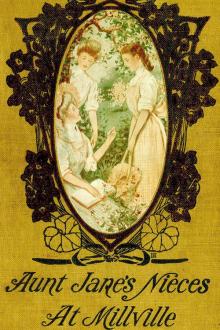Four Ghost Stories - Mrs. Molesworth (beginner reading books for adults txt) 📗

- Author: Mrs. Molesworth
- Performer: -
Book online «Four Ghost Stories - Mrs. Molesworth (beginner reading books for adults txt) 📗». Author Mrs. Molesworth
At Kronberg, on our return, we found that Herr von Walden was off on a tour to the Italian lakes, Lutz and young Trachenfels had returned to their studies at Heidelberg, George Norman had gone home to England. All the members of our little party were dispersed except Frau von Walden.
To her and to Ottilia I told the story, sitting together one afternoon over our coffee, when Nora was not with us. It impressed them both. Ottilia could not resist an "I told you so."
"I knew, I felt," she said, "that something disagreeable would happen to you there. I never will forget," she went on naïvely, "the dreary, dismal impression the place left on me the only time I was there—pouring rain and universal gloom and discomfort. We had to wait there a few hours to get one of the horses shod, once when I was driving with my father from Seeberg to Marsfeldt."
Frau von Walden and I could not help smiling at her. Still there was no smiling at my story, though both agreed that, viewed in the light of unexaggerated common sense, it was most improbable that there was any tragedy mixed up with the disappearance of the young man we had heard of at Grünstein.
"And indeed why we should speak of his 'disappearance' I don't know," said Frau von Walden. "He did not write to send the order he had spoken of—that was all. No doubt he is very happy at his own home. When you are back in England, my dear, you must try to find him out—perhaps by means of the cup. And then when Nora sees him, and finds he is not at all like the 'ghost,' it will make her the more ready to think it was really only some very strange, I must admit, kind of optical delusion."
"But Nora has never heard the Grünstein story, and is not to hear it," said Ottilia.
"And England is a wide place, small as it is in one sense," I said. "Still, if I did come across the young man, I half think I would tell Nora the whole, and by showing her how my imagination had dressed it up, I think I could perhaps lessen the effect on her of what she thought she saw. It would prove to her better than anything, the tricks that fancy may play us.
"And in the meantime, if you take my advice, you will allude to it as little as possible," said practical Ottilia. "Don't seem to avoid the subject, but manage to do so in reality."
"Shall you order the tea-service?" asked Frau von Walden.
"I hardly think so. I am out of conceit of it somehow," I said. "And it might remind Nora of the blue paper parcel. I think I shall give the cup and saucer to my sister."
And on my return to England I did so.
Two years later. A very different scene from quaint old Kronberg, or still more from the dreary "Katze" at Silberbach. We are in England now, though not at our own home. We are staying, my children and I—two older girls than little Nora, and Nora herself, though hardly now to be described as "little"—with my sister. Reggie is there too, but naturally not much heard of, for it is the summer holidays, and the weather is delightful. It is August again—a typical August afternoon—though a trifle too hot perhaps for some people.
"This time two years ago, mamma," said Margaret, my eldest daughter, "you were in Germany with Nora and Reggie. What a long summer that seemed! It is so much nicer to be all together."
"I should like to go to Kronberg and all those queer places," said Lily, the second girl; "especially to the place where Nora saw the ghost."
"I am quite sure you would not wish to stay there," I replied. "It is curious that you should speak of it just now. I was thinking of it this morning. It was just two years yesterday that it happened."
We were sitting at afternoon tea on the lawn outside the drawing-room window—my sister, her husband, Margaret, Lily, and I. Nora was with the schoolroom party inside.
"How queer!" said Lily.
"You don't think Nora has thought of it?" I asked.
"Oh no, I am sure she hasn't," said Margaret. "I think it has grown vague to her now. You know she spoke about it to us when she first came home. You had prepared us, you remember, mamma, and told us not to make too much of it. The first year after, she did think of it. She told me she was dreadfully frightened all that day for fear he should appear again. But since then I think she has gradually forgotten it."
"She is a very sensible child," said my sister. "And she is especially kind and sympathising with any of the little ones who seem timid. I found her sitting beside Charlie the other night for ever so long because he heard an owl hooting outside, and was frightened."
Just then a servant came out of the house, and said something to my brother-in-law. He got up at once.
"It is Mr. Grenfell," he said to his wife, "and a friend with him. Shall I bring them out here?"
"Yes, it would really be a pity to go into the house again—it is so nice out here," she replied. And her husband went to meet his guests.
He appeared again in a minute or two, stepping out through the low window of the drawing-room, accompanied by the two gentlemen.
Mr. Grenfell was a young man living in the neighbourhood, whom we had known from his boyhood; the stranger he introduced to us as Sir Robert Masters. He was a middle-aged man, with a quiet, gentle bearing and expression.
"You will have some tea?" said my sister, after the first few words of greeting had passed. Mr. Grenfell declined. His friend accepted.
"Go into the drawing-room, Lily, please, and ring for a cup and saucer," said her aunt, noting the deficiency. "There was an extra one, but some one has poured milk into the saucer. It surely can't have been you, Mark, for Tiny?" she went on, turning to her husband. "You shouldn't let a dog drink out of anything we drink out of ourselves."
My brother-in-law looked rather comically penitent; he did not attempt to deny the charge.
"Only, my dear, you must allow," he pleaded, "that we do not drink our tea out of the saucers."
On what trifling links hang sometimes important results! Had it not been for Mark's transgressing in the matter of Tiny's milk we should never have learnt the circumstances which give to this simple relation of facts—valueless in itself—such interest, speculative and suggestive only, I am aware, as it may be found to possess.
Lily, in the meantime, had disappeared. But more quickly than it would have taken her to ring the bell, and await the servant's response to the summons, she was back again, carrying something carefully in her hand.
"Aunt," she said, "is it not a good idea? As you have a tea-spoon—I don't suppose Tiny used the spoon, did he?—I thought, instead of ringing for another, I would bring out the ghost-cup for Sir Robert. It is only fair to use it for once, poor thing, and just as we have been speaking about it. Oh, I assure you it is not dusty," as my sister regarded it dubiously. "It was inside the cabinet."
"Still, all the same, a little hot water will do it no harm," said her aunt—"provided, that is to say, that Sir Robert has no objection to drink out of a cup with such a name attached to it?"
"On the contrary," replied he, "I shall think it an honour. But you will, I trust, explain the meaning of the name to me? It puzzles me more than if it were a piece of ancient china—a great-great-grandmother's cup, for instance. For I see it is not old, though it is very pretty, and, I suppose, uncommon?"
There was a slight tone of hesitation about the last word which struck me.
"I have no doubt my sister will be ready to tell you all there is to tell. It was she who gave me the cup," replied the lady of the house.
Then Sir Robert turned to me. Looking at him full in the face I saw that there was a thoughtful, far-seeing look in his eyes, which redeemed his whole appearance from the somewhat commonplace gentlemanliness which was all I had before observed about him.
"I am greatly interested in these subjects," he said. "It would be very kind of you to tell me the whole."
I did so, more rapidly and succinctly of course than I have done here. It is not easy to play the part of narrator, with five or six pairs of eyes fixed upon you, more especially when the owners of several of them have heard the story a good many times before, and are quick to observe the slightest discrepancy, however unintentional. "There is, you see, very little to tell," I said in conclusion, "only there is always a certain amount of impressiveness about any experience of the kind when related at first hand."
"Undoubtedly so," Sir Robert replied. "Thank you very much indeed for telling it me."
He spoke with perfect courtesy, but with a slight absence of manner, his eyes fixed rather dreamily on the cup in his hand. He seemed as if trying to recall or recollect something.
"There should be a sequel to that story," said Mr. Grenfell.
"That's what I say," said Margaret eagerly. "It will be too stupid if we never hear any more. But that is always the way with modern ghost stories—there is no sense or meaning in them. The ghosts appear to people who never knew them, who take no interest in them, as it were, and then they have nothing to say—there is no dénouement, it is all purposeless."
Sir Robert looked at her thoughtfully.
"There is a good deal in what you say," he replied. "But I think there is a good deal also to be deduced from the very fact you speak of, for it is a fact. I believe what you call the meaninglessness and purposelessness—the arbitrariness, one may say, of modern experiences of the kind are the surest proofs of their authenticity. Long ago people mixed up fact and fiction, their imaginations ran riot and on some very slight foundation—often, no doubt, genuine, though slight—they built up a very complete and thrilling 'ghost story.' Nowadays we consider and philosophise, we want to get to the root and reason of things, and we are more wary of exaggeration. The result is that the only genuine ghosts are most unsatisfactory beings; they appear without purpose, and seem to be what, in fact, I believe they almost always are, irresponsible, purposeless will-o'-the-wisps. But from these I would separate the class of ghost stories the best attested and most impressive—those that have to do with the moment of death; any vision that appears just at or about that time has generally more meaning in it, I think you will find. Such ghosts appear for a reason, if no other than that of intense affection, which draws them near those from whom they are to be separated."
We listened attentively to this long explanation, though by no means fully understanding it.
"I have often heard," I said, "that the class of ghost stories you speak of are the only thoroughly authenticated





Comments (0)